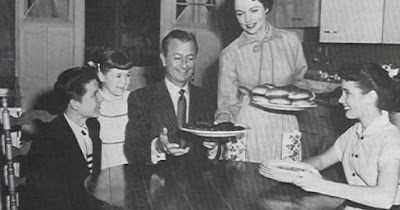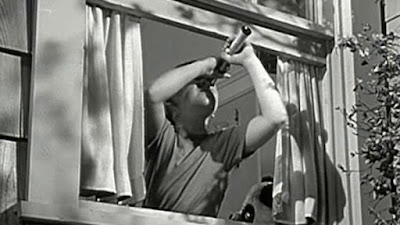In the film National Treasure, Nicolas Cage plays historian Benjamin Franklin Gates, who reads with admiration a quote from the Declaration of Independence, just before he steals it to keep it out of enemy hands:
“But when a long train of abuses and usurpations, pursuing invariably the same Object evinces a design to reduce them under absolute Despotism, it is their right, it is their duty, to throw off such Government, and to provide new Guards for their future security.”
“People don’t talk that way anymore,” he says, and you hear in his voice a longing for a time when that was not the case.
That is often my reaction after watching an episode of Father Knows Best. Out of all the 1950s situation comedies, this is the series that most often celebrated the eloquence of language, not only by quoting its masters from decades and centuries past, but also through the stirring and articulate scripts from writers like Roswell Rogers and Paul West.
Take this scene from “The Great Guy,” an episode in which Bud and his friend Kippy get jobs in the circulation department of their local newspaper. On their first day the boss, played by the fine character actor Whit Bissell, explains why working on a newspaper is a sacred trust.
“A newspaper is the mirror of man. It’s his conscience, and his crusader. It dries his tears for him, and laughs up his jokes. It shouts his triumphs and records his failures. It brings him into the world and buries him. And finally it goes to its own death carrying out his garbage. But more important than that, it’s the living moment. It’s not yesterday or this morning, it’s now. A late newspaper is no newspaper at all. You can run off five million copies, but that paper does not exist until it’s in the hands of a reader.”
I sat through a lot of journalism classes in high school and college, and never heard a better description than that one.
Perhaps the best-remembered example of oratory from this series is the prayer Jim recites at the end of the first season episode “Thanksgiving.”
“Oh Lord, we give thee thanks from the depths of our humble hearts for all the blessings thou has seen fit to bestow upon us. We thank thee for the food, which graces our table, the roof, which covers our head. We thank thee for the privilege of living as free men in a country which respects our freedom and our personal rights to worship and think and speak as we choose. We thank thee for making us a family, for giving us sincerity and understanding. But most of all, dear Lord, we thank thee for giving us the greatest gift a family may know--the gift of love for one another. Amen.”
The plot of that holiday episode revolves around Jim’s pride after leaning that Kathy wrote the best Thanksgiving poem in her class. Upon hearing the news, he expresses his own love of poetry by reciting Shakespeare’s Sonnet 18:
Shall I compare thee to a summer’s day?
Thou art more lovely and more temperate.
Rough winds do shake the darling buds of May,
And summer’s lease hath all too short a date.
And in the midst of his recitation, his secretary enters the office and picks up the next verse without missing a beat. It’s nice to think about a world where everyone can quote Shakespeare from memory.
In “Homing Pigeons” the family marvels at how Bud’s pigeons are able to find their way back to their cages from hundreds of miles away.
“How do they do it?” Margaret asks. In response Jim pulls out a poetry anthology from the living room bookshelf. “There’s a poem by William Cullen Bryant about another bird that might give us the answer”:
There is a Power whose care
Teaches thy way along that pathless coast –
Long wandering but not lost.
All day thy wings have fanned
at that far height, the cold thin atmosphere,
Yet stoop not, weary, to the welcome land,
Though the dark night is near.
He who, from zone to zone,
Guides through the boundless sky thy certain flight,
In the long way that I must tread alone,
Will lead my steps aright.
In “The Old Days,” Jim is looking through costumes for a party, when the shopkeeper recommends he and Margaret dress as Robert Burns and Elizabeth Barrett Browning. That inspires the men to quote from Burns’ most famous poem:
The year’s at the spring,
And day’s at the morn;
Morning’s at seven;
The hillside’s dew-pearl’d;
The lark’s on the wing;
The snail’s on the thorn;
God’s in His heaven,
All’s right with the world!
And in “Betty Goes Steady,” a boy Betty disdains because of peer pressure (played by Robert Vaughn!) gives her a book of essays by Ralph Waldo Emerson, and suggests she reads the one called “Self-Reliance.”
“There is a time in every man's education when he arrives at the conviction that envy is ignorance; that imitation is suicide.”
We hear these words through the characters but it’s the writers who insert them into the scripts. Why did they do it? Perhaps because as writers they have a greater appreciation for words – and for those who use them well. And perhaps they hoped that a reference to a poem or an author in the midst of a 30-minute comedy would inspire a viewer to reach for a long-untouched book on a dusty shelf, or go to the library the next day if no such volume was handy.
That was one way knowledge and culture could be passed down, especially to younger people who might be more receptive when a lesson emerged from television instead of the classroom.
But people don’t talk that way anymore. Even on television. Especially on television. I wish they still did.






David, this was such a wonderful read--and a real tribute to the show and it's writers. You may be right, that no one talks this way anymore, but you seem to. You make it still matter. You've also inspired me to start watching this classic on Tubi, it's been many years since I've seen an episode. If we don't talk again, I hope you have a Merry Christmas. 🙂🎄
ReplyDeleteThank you, Doug - I think you'll enjoy revisiting the series. "The Angel's Sweater" is a wonderful holiday episode that might be a good place to start. And Merry Christmas to you as well!
Delete